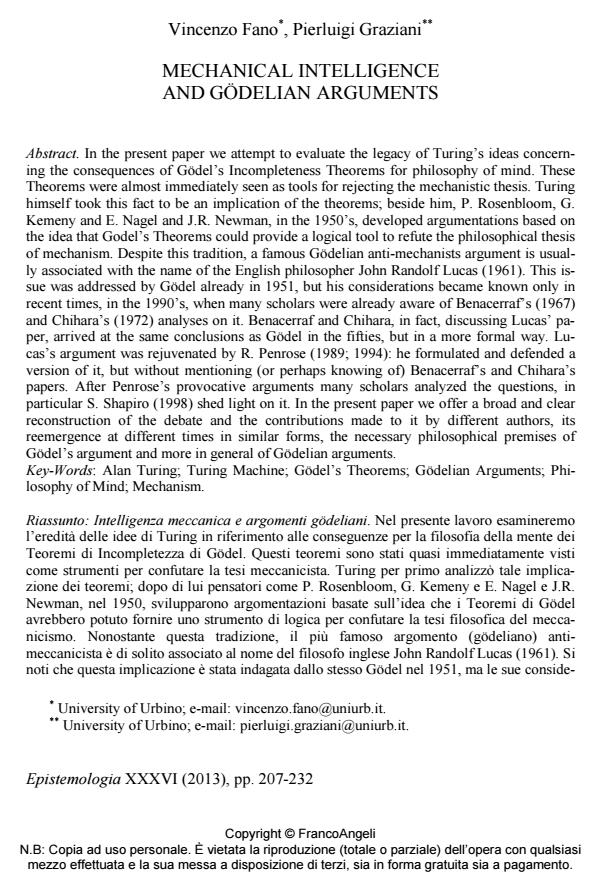Mechanical intelligence and Godelian Arguments
Titolo Rivista EPISTEMOLOGIA
Autori/Curatori Vincenzo Fano
Anno di pubblicazione 2014 Fascicolo 2013/2
Lingua Inglese Numero pagine 26 P. 207-232 Dimensione file 689 KB
DOI 10.3280/EPIS2013-002003
Il DOI è il codice a barre della proprietà intellettuale: per saperne di più
clicca qui
Qui sotto puoi vedere in anteprima la prima pagina di questo articolo.
Se questo articolo ti interessa, lo puoi acquistare (e scaricare in formato pdf) seguendo le facili indicazioni per acquistare il download credit. Acquista Download Credits per scaricare questo Articolo in formato PDF

FrancoAngeli è membro della Publishers International Linking Association, Inc (PILA), associazione indipendente e non profit per facilitare (attraverso i servizi tecnologici implementati da CrossRef.org) l’accesso degli studiosi ai contenuti digitali nelle pubblicazioni professionali e scientifiche.
In the present paper we attempt to evaluate the legacy of Turing’s ideas concerning the consequences of Godel’s Incompleteness Theorems for philosophy of mind. These Theorems were almost immediately seen as tools for rejecting the mechanistic thesis. Turing himself took this fact to be an implication of the theorems; beside him, P. Rosenbloom, G. Kemeny and E. Nagel and J.R. Newman, in the 1950’s, developed argumentations based on the idea that Godel’s Theorems could provide a logical tool to refute the philosophical thesis of mechanism. Despite this tradition, a famous Godelian anti-mechanists argument is usually associated with the name of the English philosopher John Randolf Lucas (1961). This issue was addressed by Godel already in 1951, but his considerations became known only in recent times, in the 1990’s, when many scholars were already aware of Benacerraf’s (1967) and Chihara’s (1972) analyses on it. Benacerraf and Chihara, in fact, discussing Lucas’ paper, arrived at the same conclusions as Godel in the fifties, but in a more formal way. Lucas’s argument was rejuvenated by R. Penrose (1989; 1994): he formulated and defended a version of it, but without mentioning (or perhaps knowing of) Benacerraf’s and Chihara’s papers. After Penrose’s provocative arguments many scholars analyzed the questions, in particular S. Shapiro (1998) shed light on it. In the present paper we offer a broad and clear reconstruction of the debate and the contributions made to it by different authors, its reemergence at different times in similar forms, the necessary philosophical premises of Godel’s argument and more in general of Godelian arguments.
Nel presente lavoro esamineremo l’eredita delle idee di Turing in riferimento alle conseguenze per la filosofia della mente dei Teoremi di Incompletezza di Godel. Questi teoremi sono stati quasi immediatamente visti come strumenti per confutare la tesi meccanicista. Turing per primo analizzo tale implicazione dei teoremi; dopo di lui pensatori come P. Rosenbloom, G. Kemeny e E. Nagel e J.R. Newman, nel 1950, svilupparono argomentazioni basate sull’idea che i Teoremi di Godel avrebbero potuto fornire uno strumento di logica per confutare la tesi filosofica del meccanicismo. Nonostante questa tradizione, il piu famoso argomento (godeliano) antimeccanicista e di solito associato al nome del filosofo inglese John Randolf Lucas (1961). Si noti che questa implicazione e stata indagata dallo stesso Godel nel 1951, ma le sue conside- razioni divennero note solo in tempi recenti, gli anni novanta dello scorso secolo, quando tuttavia molti studiosi erano venuti gia a conoscenza degli studi di Benacerraf (1967) e Chihara (1972) che analizzando l’articolo di Lucas arrivarono (in modo piu formale) alle stesse conclusioni alle quali Godel era pervenuto negli anni Cinquanta. L’argomento di Lucas e stato riproposto da R. Penrose (1989, 1994) il quale ha formulato e difeso una versione di esso, ma senza menzionare i lavori di Benacerraf e Chihara. Dopo l’argomento provocatorio di Penrose molti altri studiosi hanno analizzato la questione, in particolare S. Shapiro (1998). Nel presente lavoro, offriamo una ricostruzione ampia e chiara del dibattito e dei contributi ad esso apportati da diversi autori, il suo riemergere in tempi diversi in forme simili, le necessarie premesse filosofiche dell’argomento di Godel e piu in generale degli argomenti godeliani.
Parole chiave:Alan Turing; Macchina di Turing; Teoremi di Godel; argomenti godeliani; filosofia della mente; meccanicismo
- Science Between Truth and Ethical Responsibility Pierluigi Graziani, pp.153 (ISBN:978-3-319-16368-0)
- Brain, Decision Making and Mental Health Paolo Musso, pp.531 (ISBN:978-3-031-15958-9)
Vincenzo Fano, Mechanical intelligence and Godelian Arguments in "EPISTEMOLOGIA" 2/2013, pp 207-232, DOI: 10.3280/EPIS2013-002003